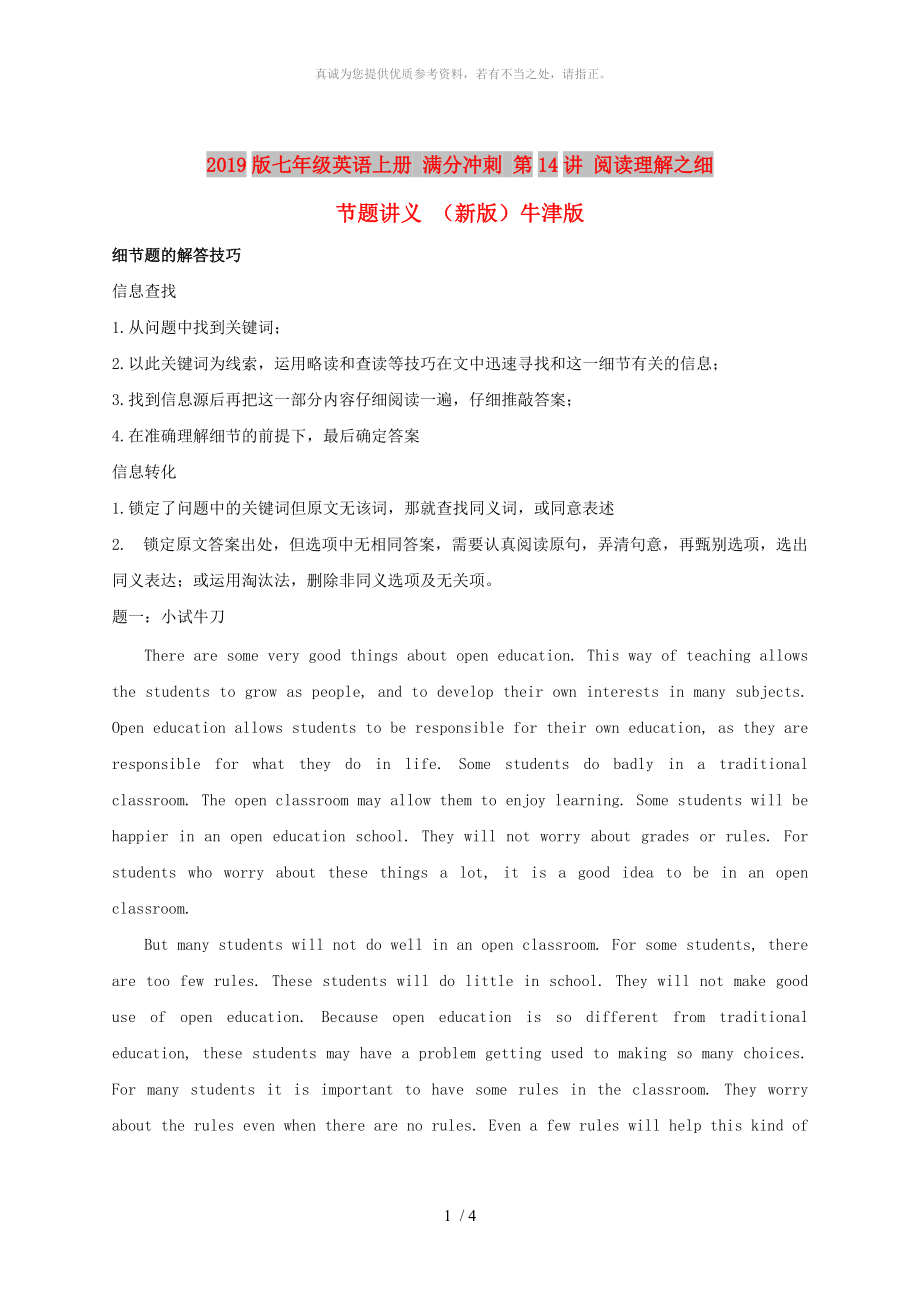《2019版七年級(jí)英語(yǔ)上冊(cè) 滿分沖刺 第14講 閱讀理解之細(xì)節(jié)題講義 (新版)牛津版》由會(huì)員分享���,可在線閱讀�,更多相關(guān)《2019版七年級(jí)英語(yǔ)上冊(cè) 滿分沖刺 第14講 閱讀理解之細(xì)節(jié)題講義 (新版)牛津版(4頁(yè)珍藏版)》請(qǐng)?jiān)谘b配圖網(wǎng)上搜索����。
1、 真誠(chéng)為您提供優(yōu)質(zhì)參考資料��,若有不當(dāng)之處���,請(qǐng)指正��。
2019版七年級(jí)英語(yǔ)上冊(cè) 滿分沖刺 第14講 閱讀理解之細(xì)
節(jié)題講義 (新版)牛津版
細(xì)節(jié)題的解答技巧
信息查找
1.從問(wèn)題中找到關(guān)鍵詞����;
2.以此關(guān)鍵詞為線索,運(yùn)用略讀和查讀等技巧在文中迅速尋找和這一細(xì)節(jié)有關(guān)的信息��;
3.找到信息源后再把這一部分內(nèi)容仔細(xì)閱讀一遍����,仔細(xì)推敲答案;
4.在準(zhǔn)確理解細(xì)節(jié)的前提下��,最后確定答案
信息轉(zhuǎn)化
1.鎖定了問(wèn)題中的關(guān)鍵詞但原文無(wú)該詞�����,那就查找同義詞�����,或同意表述
2. 鎖定原文答案出處����,但選項(xiàng)中無(wú)相同答案�,需要認(rèn)真閱讀原句�,弄清句意����,再甄別選項(xiàng),選出同義表達(dá)��;或運(yùn)用淘汰法�����,刪除非同義選項(xiàng)
2���、及無(wú)關(guān)項(xiàng)���。
題一:小試牛刀
There are some very good things about open education. This way of teaching allows the students to grow as people, and to develop their own interests in many subjects. Open education allows students to be responsible for their own education, as they are responsible for what they d
3、o in life. Some students do badly in a traditional classroom. The open classroom may allow them to enjoy learning. Some students will be happier in an open education school. They will not worry about grades or rules. For students who worry about these things a lot, it is a good idea to be in an open
4��、 classroom.
But many students will not do well in an open classroom. For some students, there are too few rules. These students will do little in school. They will not make good use of open education. Because open education is so different from traditional education, these students may have a p
5���、roblem getting used to making so many choices. For many students it is important to have some rules in the classroom. They worry about the rules even when there are no rules. Even a few rules will help this kind of students.
The last point about open education is that some traditional teachers
6����、 do not like it. Many teachers do not believe in open education. Teachers who want to have an open classroom may have many problems at their schools.
1. Open education allows the students to ______.
A. be late for school
B. be responsible for their families
C. develop their own intere
7���、sts
D. discover subjects outside class
2. Open education may be a good idea for the students who ______.
A. enjoy traditional learning
B. worry about grades or rules
C. do well in a traditional classroom
D. are responsible for what they do
3. Some students will do little i
8��、n an open classroom because ______.
A. there are too few rules
B. they hate activities
C. open education is meaningless
D. they worry about the rules
題二:全面升級(jí)
Edie Jarolim is a travel writer and food critic (評(píng)論家) . “I always loved traveling and always liked to eat, but I neve
9�、r thought about that I could make money doing both of those things.” Jarolim said. Now you can read her travel advice everywhere.
Her job in travel writing began eight years ago. After learning English in Canada, she took a test for Frommer’s travel guides, passed it, and got the job. After wo
10、rking at Frommer’s, Jarolim worked for a while at Rough Guides in London, then Fodor’s, where she fell so in love with a film about the Southwest of the U.S. that she moved there.
Now as a travel writer, she spends one-third of her year on the road. The rest of the time is spent writing.
S
11�、he said that the hard part of her job is fact-checking all the information. Sure, it’s great to write about a beautiful place, but you’d better get to the local (當(dāng)?shù)氐? museum and spend hours correcting or you could really ruin (毀掉) someone’s vacation.
1. Which country does Jarolim live in now?
A. M
12、exico B. The U.S.
C. The U.K. D. Canada
2. What is difficult for Jarolim?
A. Working in different places to get information
B. Finishing her work as soon as possible.
C. Checking all the facts in her writing.
D. Passing a test to be a travel writer.
�第14講 閱讀理解之細(xì)節(jié)題
題一:1.C 2.B 3.A
題二:1.B 2.C
4 / 4
 2019版七年級(jí)英語(yǔ)上冊(cè) 滿分沖刺 第14講 閱讀理解之細(xì)節(jié)題講義 (新版)牛津版
2019版七年級(jí)英語(yǔ)上冊(cè) 滿分沖刺 第14講 閱讀理解之細(xì)節(jié)題講義 (新版)牛津版

